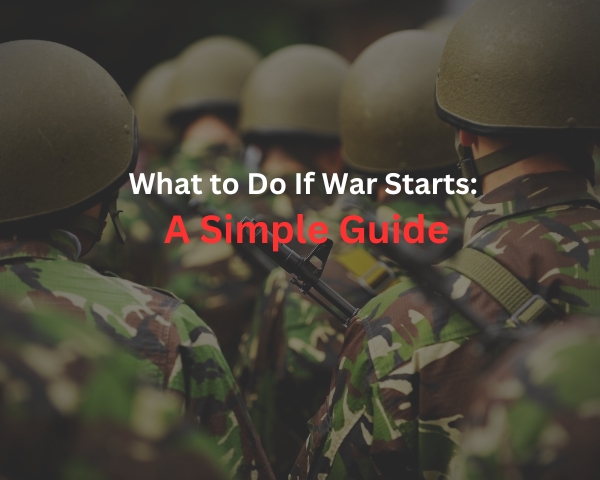War is a frightening scenario, but being prepared can help you and your family stay safe. Here’s an easy-to-follow guide on how to prepare and act if war begins in your area.
Before Anything Happens
Preparation is key. Here’s what you can do now:
- Stock Essentials
- Food: Store non-perishable items like canned food, rice, pasta, and dried fruits. Aim for at least two weeks of supplies.
- Water: Keep enough water for everyone in your household (3 liters per person per day).
- Medications: Ensure you have a first aid kit and any essential prescriptions.
- Create an Emergency Kit
Include:- Flashlight and extra batteries
- Portable phone charger
- Important documents (ID, passports, insurance papers) in a waterproof bag
- Maps (physical, not just digital)
- Cash in small denominations
- Know Safe Locations
- Identify nearby bomb shelters or safe zones.
- Learn evacuation routes from your city or town.
- Stay Informed
- Follow reliable news sources and your local government’s emergency channels.
- Sign up for alerts if available in your area.
- Plan with Your Family
- Decide on a meeting point if you get separated.
- Teach everyone how to use emergency contacts.
When War Breaks Out
- Stay Calm and Assess the Situation
- Avoid panic and focus on staying safe.
- Check the news or emergency alerts for accurate updates.
- Seek Shelter
- Move to a designated shelter or the safest area in your home, like a basement or an interior room away from windows.
- If outside, find cover immediately—lie flat and protect your head.
- Avoid Dangerous Areas
- Stay away from military bases, airports, and other potential targets.
- Avoid large crowds as they can become targets.
- Communicate Carefully
- Let loved ones know you’re safe, but avoid sharing your location publicly.
- Conserve your phone battery for emergencies.
- Follow Instructions
- Listen to local authorities for evacuation orders or other guidance.
If You Need to Evacuate
- Grab Your Emergency Kit
- Take only essentials; keep your load light for mobility.
- Travel Safely
- Use safe, marked routes as directed by authorities.
- Stay together with your family.
- Stay Alert
- Be aware of roadblocks, checkpoints, or dangerous zones.
After the Danger Has Passed
- Check on Loved Ones
- Make sure everyone in your circle is safe and accounted for.
- Support Your Community
- Volunteer or offer help to others if possible.
- Stay Informed
- Keep up with the news for updates on the situation and when it’s safe to return to normal activities.
Final Thoughts
War is a worst-case scenario, but preparation can save lives. Stay calm, be ready, and prioritize safety for you and your family.





